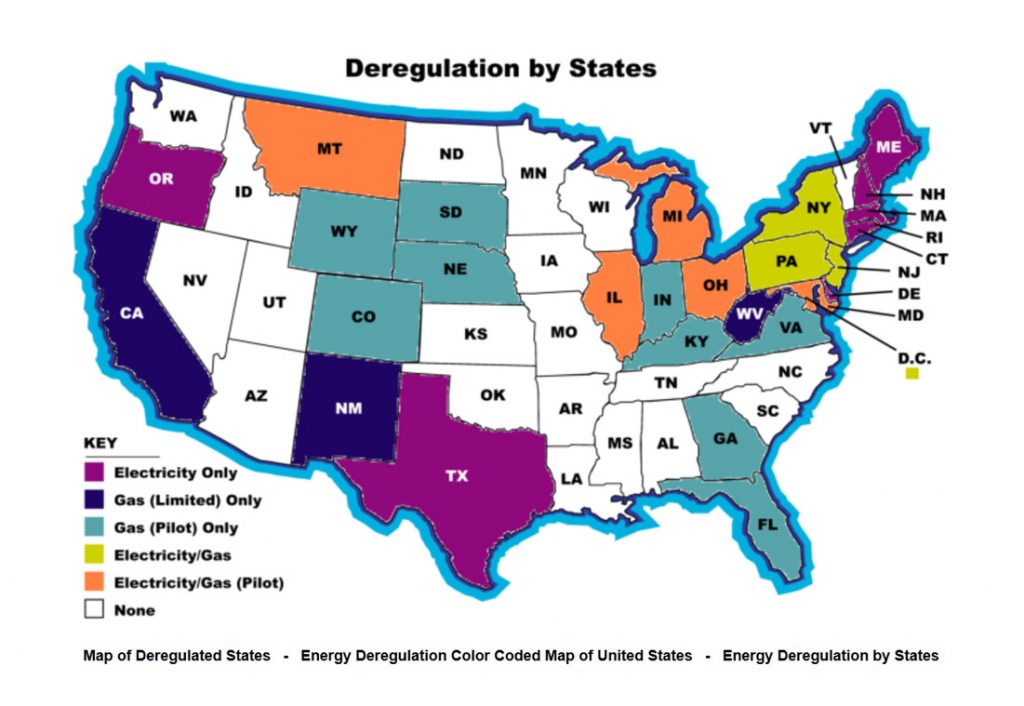Below are some common questions and answers related to deregulated states across the country. Although rules and regulations vary by state, many are consistent on a national level.
Your current Transmission and Distribution Service Provider continues to deliver electricity to your business. Your local wires company still responds to service interruptions and continues to maintain the poles and wires. You will continue to receive the same reliable service you are used to with your local wires company, regardless of which Retail Electric Provider you receive service from.
You can choose to buy your electricity from a different electric provider than the original incumbent provider for your area. These companies are commonly referred to as Retail Electric Providers (REP’s) or Electric Service Providers (ESP’s). Additionally, your bill now looks different than bills you have received in the past, but each REP or ESP provides the same standard information. Transmission and Distribution charges are passed through without markup to the consumer by your REP or ESP.
Depending upon the state in which your business resides, you may receive one bill including both supply and delivery charges, or separate bills from both your energy provider as well as your local transmission and distribution company.
No. Each state has different rules and regulations. In some states, city-owned utilities and member-owned electric cooperatives have the option of giving their customers a choice of providers, or keeping their grid closed to outside competition. To see if competition is active in your area, please call Electricity Helper.
Competition in other industries has often brought lower prices and innovative, new products and services. Having more control over your buying decision should make it easier to determine what matters most to you, whether it’s price, renewable energy, customer service, or simply a name you know.
Electric competition also should help the environment because energy providers must offer some energy from renewable energy sources. Renewable energy – such as wind, solar, hydroelectric and biomass (gas released from landfills) – produce less air pollution than sources that rely on burning coal or natural gas.
Energy commodity rates fluctuate based upon supply, demand, weather and generation resources within each region. Typically, eastern states have more traditional coal-based generation sources, while many southern states such as Texas, are more heavily fueled by natural gas fired plants. Regardless of where your company resides, electric deregulation has resulted in extreme volatility since electricity cannot be stored like other traded commodities.
Electricity is the most volatile of all traded commodities, and, as a result requires more in-depth risk management strategies. As many companies in the airline industry have recently experienced, minimal or improper hedging strategies can result in extreme variances in energy costs from one year to the next.
No. No matter which energy provider you choose, your electricity will continue to be delivered safely and reliably by the Transmission and Distribution Service Provider, a company regulated by the PUC within each state.
No. If you decide not to choose a new energy provider, your service will be provided by the incumbent or default provider at what is known as the default or standard offer rate as defined by each state’s rules and regulations. The incumbent or default provider is the electric provider that was part of the original electric company that generated and sold electricity in your area, that now only sells electricity and provides customer service.
In most cases, the default or standard offer rate is set higher than competitive market rates to encourage competition. Although, based upon market movement in each region, there are situations in which the default or standard offer rate will be lower than current market rates. Your Electricity Helper representative can help guide you through the process comparing various price options and terms to the default and standard offer rates in your area.
Contact your Electricity Helper representative to discuss the pros and cons of index-based versus fixed rate pricing. Each customer has different needs and levels of risk tolerance. A well-informed account manager can help you to determine the product option that is best for you.

